Key takeaways:
- Structured practice schedules enhance focus, productivity, and discipline, enabling consistent skill development.
- Setting SMART goals provides clarity and direction, while breaking down larger objectives into manageable tasks boosts accountability.
- Regular progress monitoring and incorporating feedback from peers and mentors are essential for adapting practice plans and overcoming stagnation.
- Staying motivated can be achieved by celebrating small victories, changing environments, and using energizing music to enhance the practice experience.
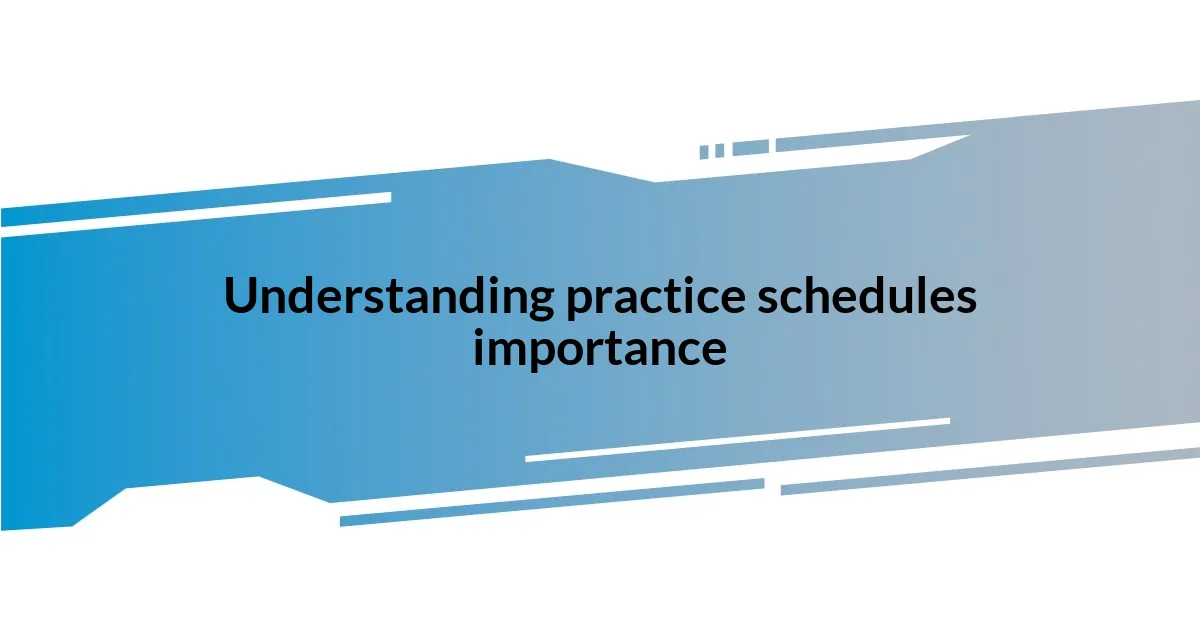
Understanding practice schedules importance
Practice schedules are the backbone of any successful training regimen. Reflecting on my own experience, I remember the early days of honing my craft when I struggled to find focus. It wasn’t until I started implementing structured schedules that I noticed significant improvement. This made me realize that without a solid plan, I was merely wandering through my practice rather than moving towards my goals.
Have you ever felt overwhelmed by the sheer amount of material to cover? I certainly have. A well-defined practice schedule alleviates that stress. It not only breaks down daunting tasks into manageable segments but also instills a sense of accountability. By mapping out my sessions, I could track progress and celebrate small wins, which felt incredibly motivating.
Moreover, the importance of practice schedules extends beyond just productivity; they cultivate discipline. There were times when I didn’t feel like practicing, but knowing I had a schedule pushed me to show up. This consistency, I’ve found, is what transforms fleeting interest into lasting skill. Isn’t it fascinating how a simple document can shape our dedication and outcomes in such profound ways?
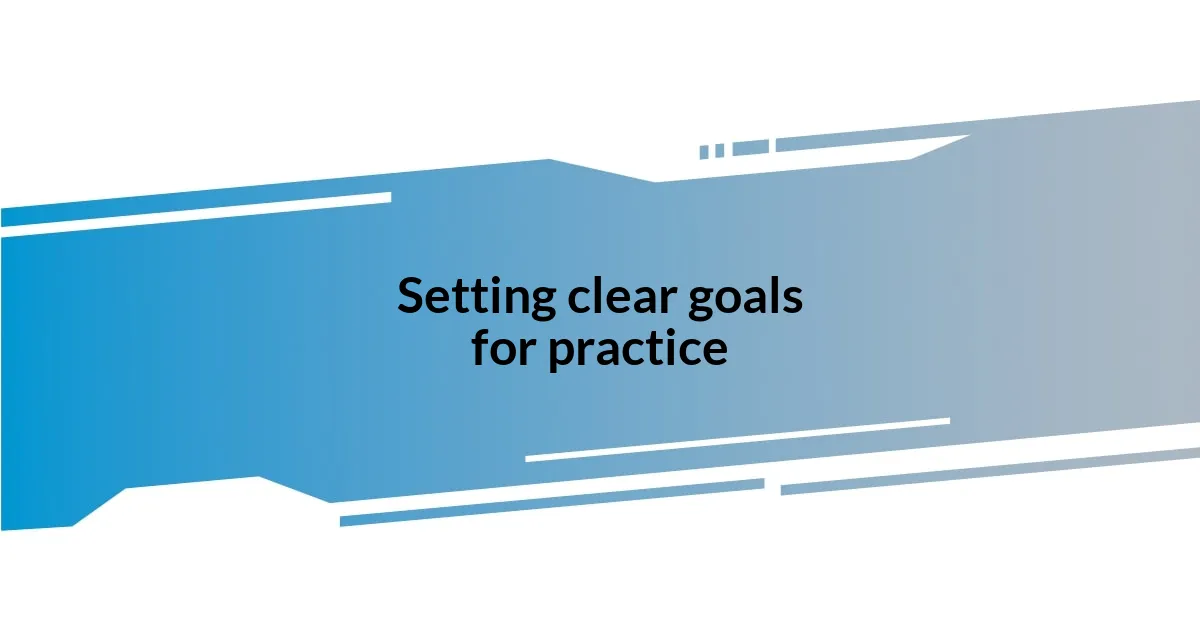
Setting clear goals for practice
Setting clear goals for practice is essential for maintaining direction and focus. I recall a time when I was juggling multiple skills and started feeling lost. I realized that without pinpointing specific objectives, each session felt aimless, like wandering in a fog. Since then, I’ve adopted the practice of setting SMART goals—Specific, Measurable, Achievable, Relevant, and Time-bound. This method not only clarifies my focus but also creates a roadmap for what I want to achieve in each practice session.
To effectively define your own practice goals, consider these tips:
- Write it Down: Putting your goals on paper makes them more tangible and can boost accountability.
- Break It Down: Divide larger goals into smaller, actionable tasks that are easier to tackle.
- Reflect Often: Periodically review your goals to assess progress and make adjustments as necessary.
- Stay Flexible: Life can be unpredictable; be open to changing your goals as you evolve in your practice.
- Celebrate Achievements: Recognize when you’ve met your goals to keep motivation high and reinforce your commitment.
Embracing this approach transformed my practice sessions from chaotic endeavors into structured, fulfilling experiences that propelled my growth.
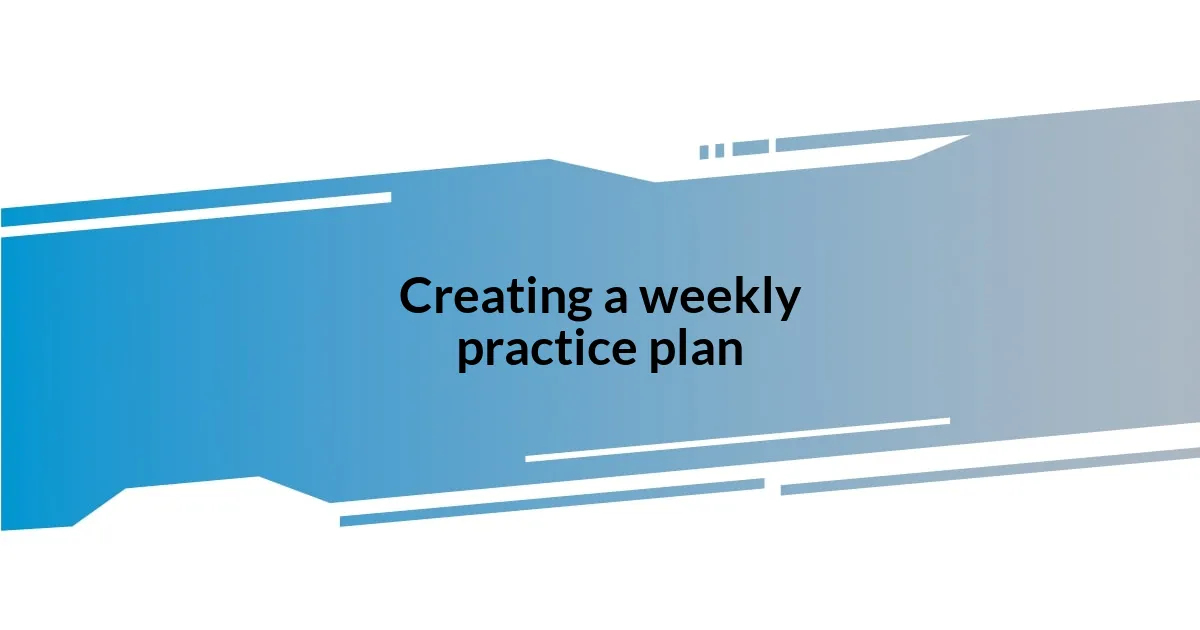
Creating a weekly practice plan
Creating a weekly practice plan requires thoughtful organization and a willingness to adapt. I’ve found that mapping out my week not only gives structure but also provides a framework to balance different skills. Each week, I categorize my sessions by focusing on specific areas, like technique, repertoire, or improvisation. This segmentation empowers me to allocate sufficient time to each skill, ensuring that my practice remains well-rounded and dynamic.
In my own experience, I’ve discovered the importance of flexibility within my practice schedule. One week, I might plan a hefty focus on rhythm exercises, but if I notice my enthusiasm waning, I revisit my plan to incorporate some spontaneous repertoire play. I believe listening to my instincts keeps my practice vibrant and prevents burnout. How do you keep your practice fresh while adhering to a structure? I often incorporate techniques such as themed days—dedicating Tuesdays to improvisation and Thursdays to technique—to maintain excitement during practice.
To simplify the planning process, I rely on visual aids like charts and tables. These not only help in organizing my time but also reflect my progress. I create a comparison table to assess how much time I’ve dedicated to each skill versus my goals. This visual representation makes it easy to adjust my focus for the upcoming weeks based on what I’ve learned.
| Skill Area | Time Allocated (Hours) |
|---|---|
| Technique | 4 |
| Repertoire | 3 |
| Improvisation | 2 |
| Review & Reflection | 1 |
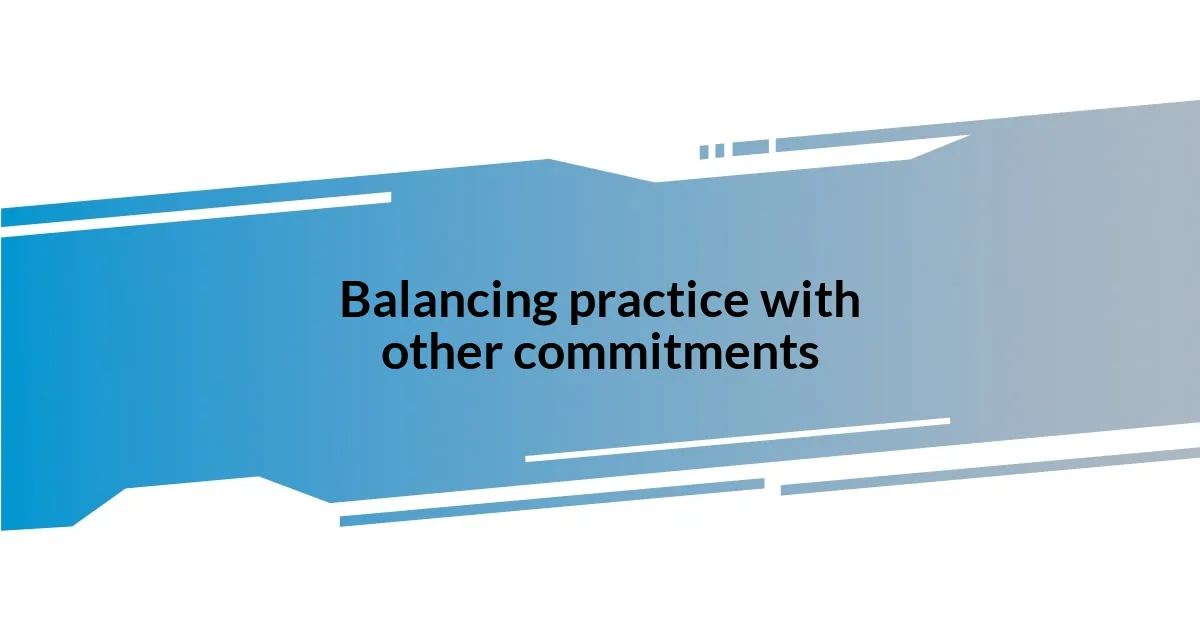
Balancing practice with other commitments
Balancing practice with other commitments can often feel like a juggling act. I remember one particularly hectic period when my school workload peaked, leaving little room for focused practice. I had to find a way to integrate my passion with daily responsibilities. So, I started scheduling shorter, high-quality practice sessions during pockets of free time—like right after class or even during my lunch break. This approach not only kept my skills sharp but also made me feel accomplished even on busy days.
It’s essential to assess your priorities regularly. There have been instances when I’ve had to say “no” to social events to carve out time for practice. It wasn’t easy at first, but prioritizing my growth allowed me to be more in tune with my journey. Have you ever felt guilty about missing out? I found that communicating my goals with friends led to their support, making it easier to strike a balance.
One technique that has worked wonders for me is integrating practice into my daily routine. For example, I attempt to incorporate musical warm-ups while commuting or listening to masterclasses while cooking. Combining activities helps me stay engaged without overwhelming my schedule. Who knew multitasking could be so beneficial? This way, I maintain my commitment without sacrificing time dedicated to other areas of my life, finally feeling like I’m thriving rather than surviving.
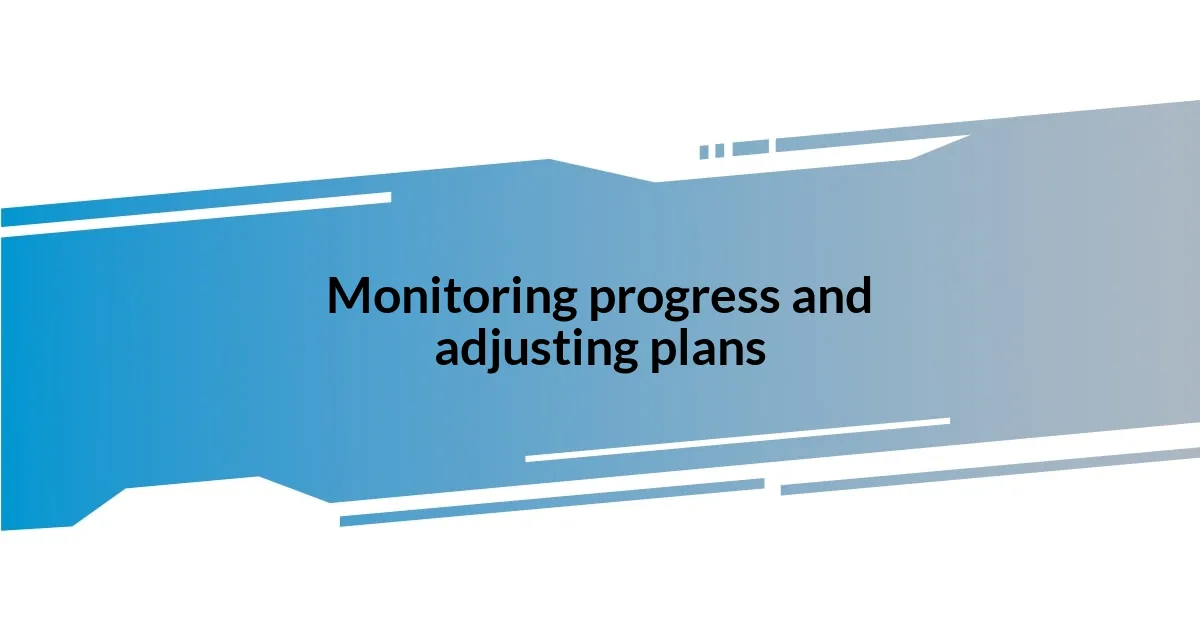
Monitoring progress and adjusting plans
Monitoring my progress is a key part of my practice routine. I keep a detailed journal where I jot down notes after each session, reflecting on what worked and what didn’t. It’s like having a conversation with myself that helps me identify patterns—am I progressing or hitting a plateau? Tracking these insights has proven invaluable in informing my next steps.
When I notice improvement stagnating, I take it as a cue to reassess my goals. For instance, I once realized I was spending too much time on complex pieces that demanded more than my current skill level. By shifting my focus to simpler, more rewarding material, I reignited my motivation and made significant gains. Have you ever felt stuck in your progress? It’s amazing what a slight pivot can do to reinvigorate your practice.
Communication with mentors also plays a crucial role in how I adjust my plans. I regularly check in with my instructor for feedback, which provides me with an outside perspective on my development. That feedback is like a compass guiding me to better align my efforts with achievable benchmarks, ultimately leading to a more fulfilling practice experience. Isn’t it powerful how a fresh set of eyes can illuminate paths we might have overlooked?
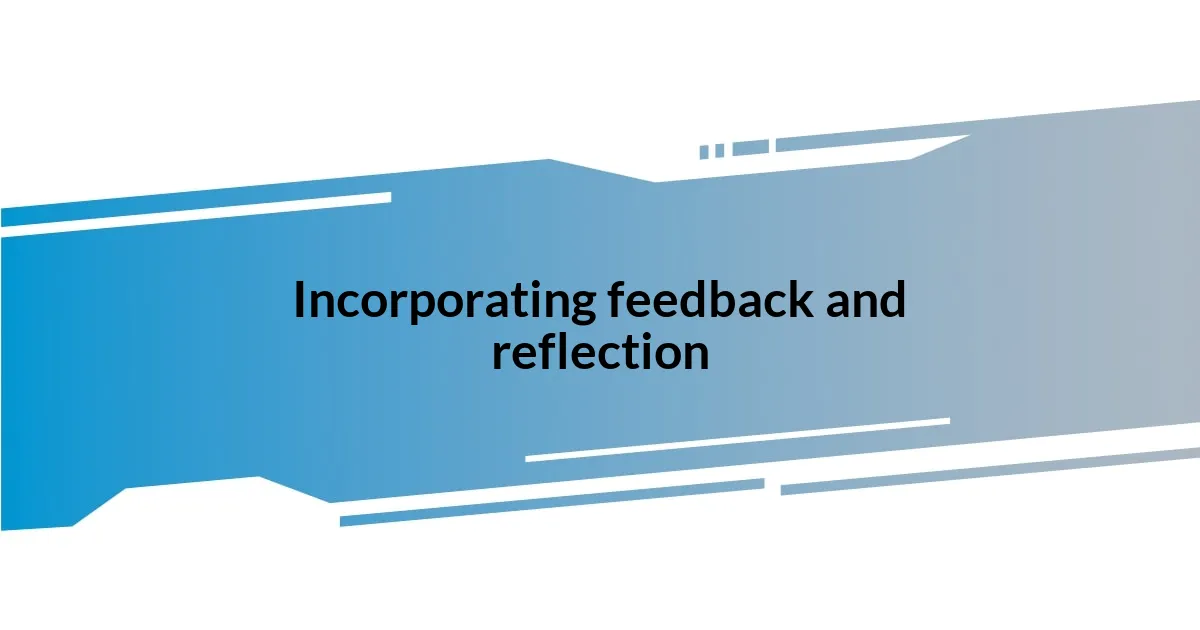
Incorporating feedback and reflection
Incorporating feedback and reflection has been a game-changer for my practice sessions. I often find myself thinking back to a moment when I received constructive criticism from a peer. It stung a little, but instead of shutting down, I used that feedback as fuel. Every time I felt resistance from their observations, I reminded myself that it was an opportunity for growth. How often do we see feedback as a gift rather than a slight? I learned to embrace it, and this shift in perspective transformed my approach.
Reflection is another vital piece of my process. After particularly challenging sessions, I take a few moments to think about what I accomplished and where I struggled. I remember one day feeling utterly frustrated after a practice that just didn’t click. Rather than dismissing the session as a failure, I wrote down my thoughts. This reflection revealed that I was overthinking a fundamental technique. It was then I realized the importance of patience in my journey. So, next time you hit a wall, I encourage you to pause and reflect—it might just lead to a breakthrough!
Engaging with my practice through feedback doesn’t just happen in isolation. I often turn to online forums and communities where musicians share their experiences. Participating in these discussions creates a supportive environment where I can ask questions and provide insights. Once, after sharing a video of my performance, I received a myriad of tips that I hadn’t considered before. It was exhilarating! Finding a community that values reflection and feedback as much as I do has enriched my practice like nothing else. Isn’t it incredible how collaboration amplifies our growth?
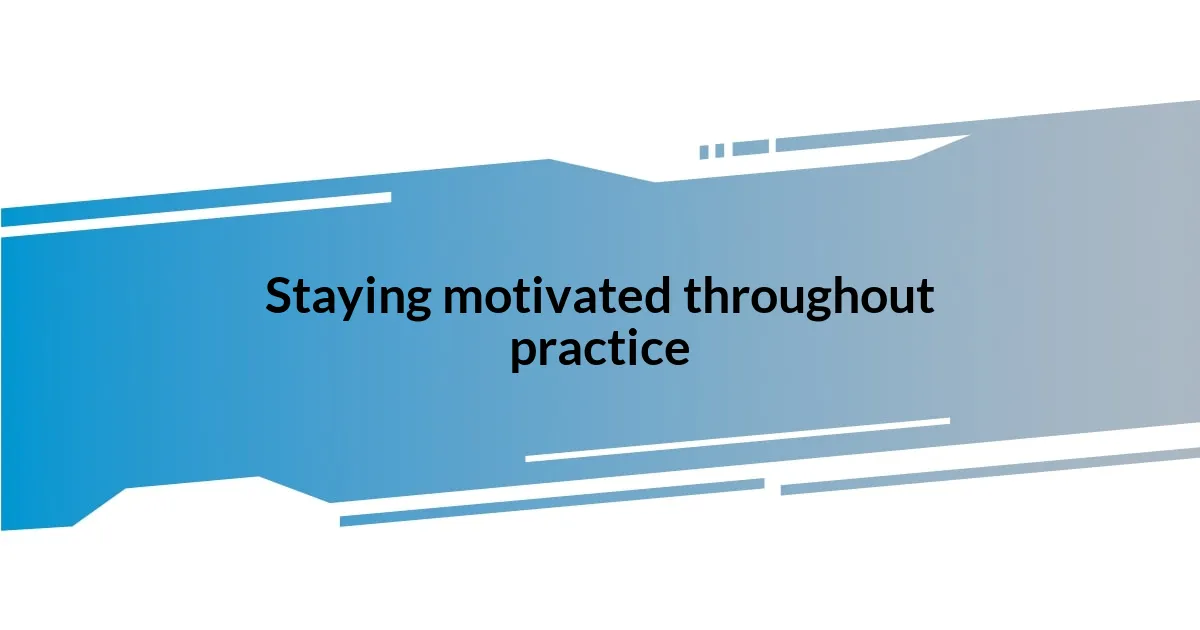
Staying motivated throughout practice
Staying motivated during practice can be quite a challenge, but I’ve discovered a few strategies that keep my spirits high. One of my favorites is setting small, achievable goals for each session. For example, on a particularly tough day, I aimed to master just one measure of a song that had been eluding me. When I finally played it correctly, the sense of accomplishment motivated me to tackle the next challenge. Don’t you think celebrating these tiny victories can fuel our journey?
I also find that changing my environment can breathe new life into my practice. There have been times when just shifting my setup—from my usual desk to the coziness of my living room—made a significant difference. It’s like when I bring my guitar to the park and play outside. The fresh air and natural surroundings spark a different kind of creativity in me. Do you have a favorite spot that inspires you while you practice?
Additionally, I often incorporate music that energizes me into my warm-up routine. On days when I feel a lack of drive, I’ll toss in some upbeat tracks that resonate with my mood. I recall one session when I put on a song that always gets my heart racing, and before I knew it, I was fully immersed in my practice. It’s like a motivational jolt! Music has a unique power, doesn’t it? Leveraging that power can transform a mundane practice session into an inspiring experience.